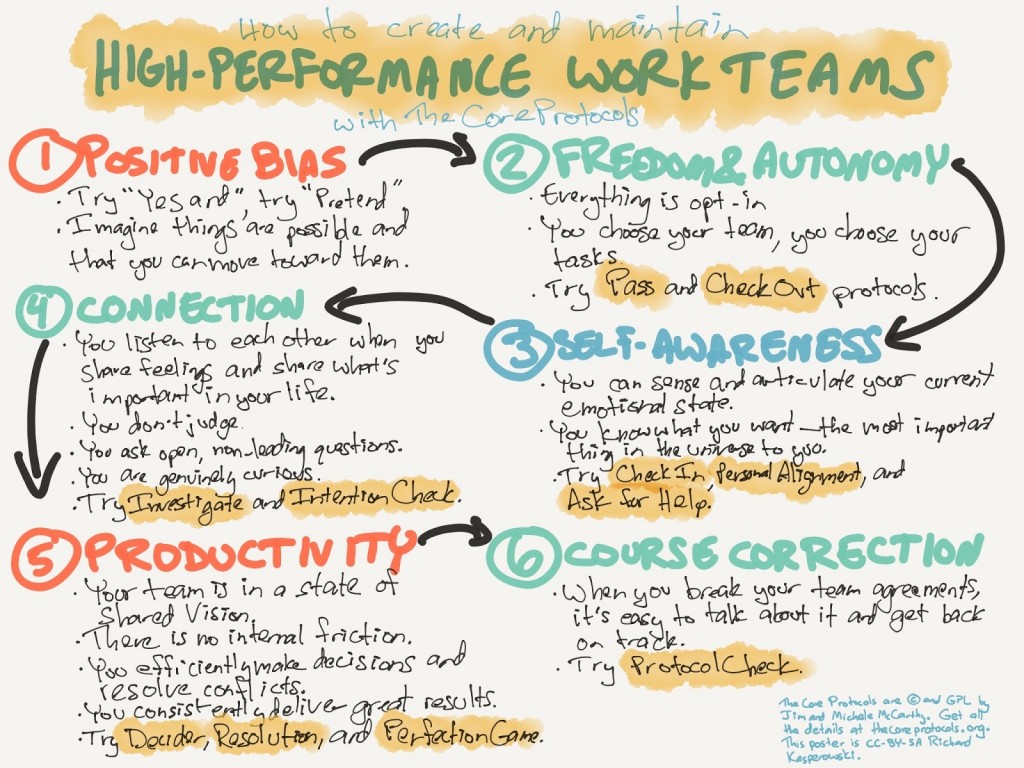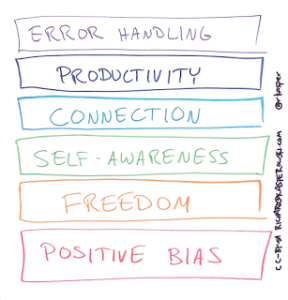The Core Protocols – Make Yourself And Your Team Great
The Core Protocols
From Google’s Aristotle project (2015) we know that successful teams need to have Psychological Safety. And we have very few ideas on how to achieve this, measure it, or even explain it.
Google started his research studies about high-performance teams in 2010. In the same year, Jim and Michele McCarthy published their now famous "The Core Protocols" (TCPs for short) after starting their research with an experiential workshop in 1996 about the conditions of high-performance, results-oriented, successful teams.
Jim and Michelle published their The Core Protocols in the tradition of SW design pattern thinking, 1 This framework of behavioural communication patterns, stipulated in a strong technical and nerd affine prose, affected Google in its Aristotle project very much.
Today Greatnessguild.org, LiveInGreatness.com, and Richard Kasperowski are vivid promoters of the TCPs. I had the pleasure to attend a workshop Richard gave about Core Protocols at the ALE 2017, Prague. I am happy that I 'am allowed to use a lot of Richard's material under CC-BY-SA in this post.
The Core Protocols In A Nutshell
The Core
The TCPs are patterns of human behaviour to support teams in collaboration, communication, and commitment to the common goal. As rules and guidelines, they describe how to behave properly as a team, in meetings, and in interpersonal interactions. They are best practices to become an exceptional team. These practices enable people and teams to:
- learn results-oriented behaviours,
- enter a state of shared vision and stay there,
- trust each other,
- stay rational and healthy,
- make decisions effectively, and
- keep moving toward the team’s goals.
Fundamental for the TCPs is a positive, results and solution-focused attitude and worldview: non-negativity, non-negation, and no pretending. Linchpin is the "Yes-and" game, a well-known pattern for innovation, brainstorming, and improv theatre acting.
In addition to the foundational Positive Bias, the Core are five necessary conditions that must be fulfilled: Freedom, Self-Awareness, Connection, Productivity and Error Handling.
To apply the TCPs in your organisation or team, you have to create a space of:
- Non-Negativity. – Accept the positive mindset by your personal commitment: "Everybody has to agree on a positive bias for the time of our mutual collaboration."
Personal commitment can be stated as a written contract with oneself or with a certain group (team, workshop participants, co-learners in training, etc.). Examples of personal commitment forms are Greatness Guild Core Form, and LiveInGreatness Personal Commitments Form.
Sounds easy and it's hard: It really means, never, ever, negating others' ideas. – In terms of the "Yes-and" game: always say "Yes-and", never, ever, say "Yes-but".
You show your co-workers your willingness to cooperate by entering the Check-In protocol. - Freedom/Autonomy. – The work of Daniel Pink and Susan Fowler show us that autonomy (freedom) is a major motivating factor for us humans. More than any financial bonuses.
In TCPs freedom means that every team member can choose and make decisions by themselves. – For e.g., if a meeting shows to have no value for me, I have the right to quit. – To guarantee freedom, everybody can “pass” an activity to which she doesn't contribute any value anymore. When someone is passing, ask for reasons, if needed. – But never, ever start a discussion about the "Why". If the person gives you reasons, accept them. If no reasons are given, accept the fact only. Period. – The Pass protocol has its equivalent to the Open Space Technology by the "Law of two feet".
Other core protocols to ensure freedom and autonomy are “Asking for help” or “Personal Alignment”. With these protocols, you address your desires and what’s blocking you, what you really want. - Pretending. – In its negative connotation "pretending" is equal to faking and lying. The positive interpretation of "pretending" however is "asking for respectability".
Thus, in the TCPs context, pretending stands for as well of "always behave you are respected" (a kind of Kantian imperative) as "always demand the respect you deserve".
The Core Commitments
The Core – Non-Negativity, Freedom/Autonomy, Pretending – founds eleven Core Commitments. And the eleven Core Commitments establish the Core Protocol Stack consisting of eleven Core Protocols. Some of the Core Commitments can be split into more granular details. (For more details about Core Commitments see here.)
- „I commit to engage when present.” – This is the most crucial, most important and most difficultly realisable commitment. In easy words: If you show up be fully engaged. No side work or preparing other stuff in parallel. Either you are 100% in or you should leave – Check-Out (Right to Pass): Show your teammate the respect she deserves: "I'm 100% with you - I'll support our goal/team" or "Sorry, don't count on me".
To know and disclose what I want, what I think, and what I feel. – To always seek effective help. – To decline to offer and refuse to accept incoherent emotional transmissions. – When I have or hear a better idea than the currently prevailing idea, I will immediately either propose it for decisive acceptance or rejection and/or explicitly seek its improvement. – I will personally support the best idea regardless of its source.
- „I will seek to perceive more than I seek to be perceived.” – I ensure you I'll support you even if I won't get out of it as much as you. – A very altruistic momentum.
- „I will use teams, especially when undertaking difficult tasks.” – I rely on teamwork and cross-functional collaboration, not on heroic firefighting.
- „I will speak always and only when I believe it will improve the general results/effort ratio.” – I shut up if I can't/won't contribute value. – This is VERY, VEry, very difficult for alpha egomaniacs.
- „I will offer and accept only rational, results-oriented behaviour and communication.” – I ensure you, I'll keep personal emotions and animosities aside.
- „I will disengage from less productive situations.” –
When I cannot keep these commitments. – When it is more important that I engage elsewhere.
- „I will do now what must be done eventually and can effectively be done now.” – I ensure you take the needed actions immediately.
- „I will seek to move forward toward a particular goal, by biasing my behaviour toward action.” – To reach the goal I'll focus on actions/activities.
- „I will use the Core Protocols (or better) when applicable.”– For me, the Core Protocols are a valuable instrument. To use it properly I'll use the Protocol Check protocol as often as needed.
I will offer and accept timely and proper use of the Protocol Check protocol without prejudice.
- „I will neither harm—nor tolerate the harming of—anyone for his or her fidelity to these commitments.” – This is for me a reminder that yes I am committed to these protocols, and also others.
- „I will never do anything dumb on purpose.” – It's actually a lot harder than it seems. It's in sync with behaving rationally, and unfortunately, in the corporate world, not everybody behaves rationally.
The Core Protocols Stack
The Core Protocols can best be visualised as a layered stack (Richard Kasperowski). This is a very intuitive way to understand the idea behind these procedures.
| Attitude | Theme | Core Protocol | Description |
| Error Handling | Protocol Check | Use Protocol Check when you believe a protocol is being used incorrectly in any way or when a Core Commitment is being broken. | |
| Decider Protocol | Use Decider anytime you want to move a group immediately and unanimously towards results. | ||
| Focus on Results | Productivity | Resolution Protocol | When a Decider vote yields a small minority of outliers, the proposer quickly leads the team, in a highly structured fashion, to deal with the outliers. The Resolution protocol promotes forward momentum by focusing on bringing outliers in at the least cost. |
| Perfection Game Protocol | The Perfection Game protocol will support you in your desire to aggregate the best ideas. Use it whenever you desire to improve something you’ve created. | ||
| Investigate Protocol | Investigating allows you to learn about a phenomenon that occurs in someone else. Use it when an idea or behaviour someone is presenting seems poor, confusing, or simply interesting. | ||
| Listen to Other | Connection | Intention Check Protocol | Use Intention Check to clarify the purpose of your own or another’s behaviour. Use it when you aren’t expecting a positive outcome resulting from the current behaviour. Intention Check assesses the integrity of your own and another’s intention in a given case. |
| Ask for Help Protocol | The Ask For Help protocol allows you to efficiently make use of the skills and knowledge of others. Ask For Help is the act that catalyzes connection and shared vision. Use it continuously, before and during the pursuit of any result. | ||
| Check-In Protocol | Use Check-In to begin meetings or anytime an individual or group Check-In would add more value to the current team interactions. | ||
| Listen to Yourself | Self Awareness | Personal Alignment Protocol | The Personal Alignment protocol helps you penetrate deeply into your desires and find what’s blocking you from getting what you want. Use it to discover, articulate, and achieve what you want. The quality of your alignment will be equal to the quality of your results. |
| Right to Pass Protocol | The Pass protocol is how you decline to participate in something. Use it anytime you don’t want to participate in an activity. | ||
| Law of Two Feet | Freedom | Check-Out Protocol | Check Out requires that your physical presence always signifies your engagement. You must Check Out when you are aware that you cannot maintain the Core Commitments or whenever it would be better for you to be elsewhere. |
| Non-Negativity | |||
| Say "Yes" | Positiv Bias | Non-Negation | |
| Pretend |
How To Apply The Core Protocols
In the following, I list some situations you can use the core protocols to get back on track again.

Culture Hacking — The Essentials
Culture Hacking is a cornerstone of the startup scene and lean change management.

Levels of Commitment
Giving and accepting commitment creates trust. I rely on your promise to be on a certain day for a certain time to support me. If you can't do this or do not show up I am disappointed. You are for me not a trustworthy person any longer. And all of a sudden commitment gets an ethical touch. Commitment is an act, not a

Nudging – The Ideas Behind It

Pass or Check-out – Take Care, Show Responsibility
As a dedicated disciple of the Core Protocols, you are generally positively inclined to everything you do.
Use the Personal Alignment protocol to identify what blocks you. – And it is your freedom and autonomy to Check-Out or to Pass whenever you think it is necessary.

Protocol Check – Prevent Getting Hijacked

Show With Minimal Effort Your Respect, Commitment, Engagement, And Concerns
Further Readings
Books, Blogs
- Jim, Michele McCarthy: The Core Protocols. HTML, PDF, book (Amazon)
- Richard Kasperowski: The Core Protocols. A Guide to Greatness. Amazon 2015.
- Paul Sobocinski: Core Protocols and Mindfulness — Part 1, Part 2, via Medium.com, 2016
- Mu Qiao: Core Protocols: magic behind making good decisions quick, via Medium.com, 2017.
- Hannes Horn: An approach to build great (agile) teams, via Medium.org, 2016.
Communities
- Richard Kasperowski: Great People, Great Leaders, and Productive Teams. Website.
- GreatnessGuild.org - https://www.greatnessguild.org/
- LiveInGreatness.com - https://liveingreatness.com/
Presentations, Videos
- _Scrum Pulse Webinar: Ralph Jocham, The Core Protocols. Youtube, 2016.
- Peter Antman: Core Protocols. A workshop. Slideshare, 2016.
- Yves Hanoulle: The Core Protocols Zen. Slideshare, 2009.
: Ohio University Women's Rugby Roster • Richard Kasperowski • Richard Kasperowski, .









Leave A Comment